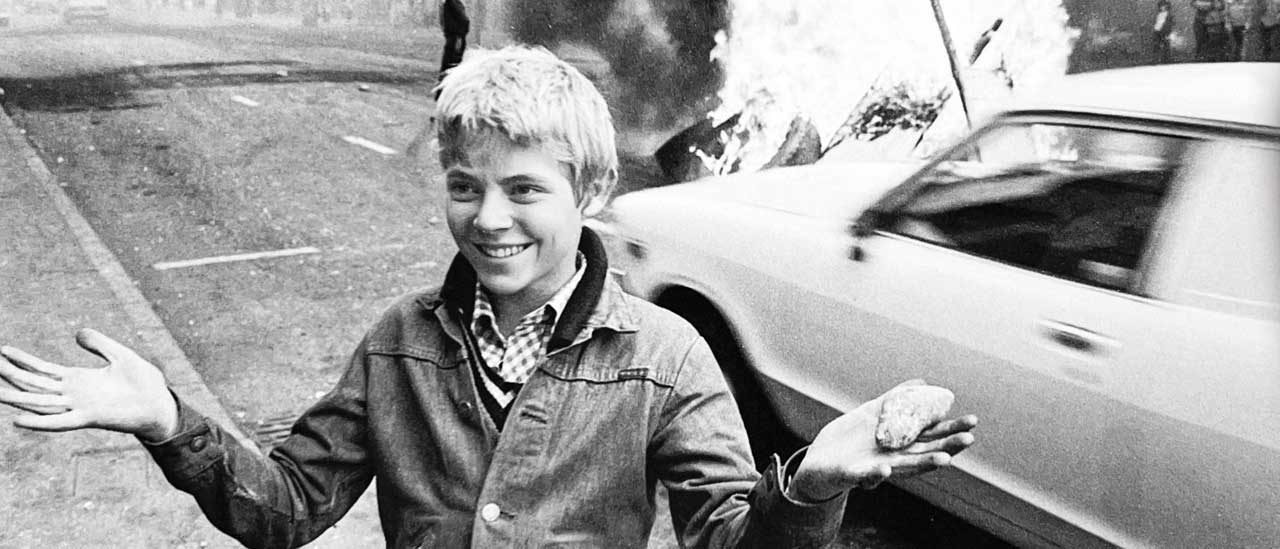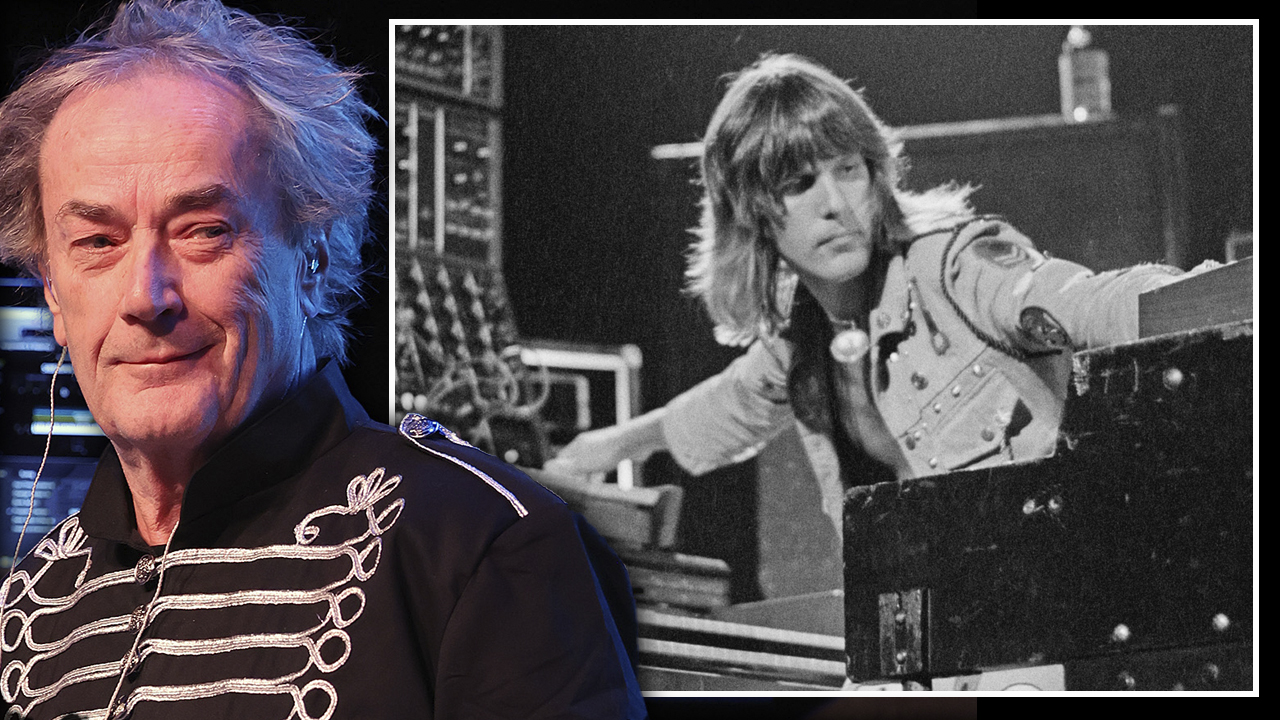You can trust Louder
On August 14, 1969, following three days of intense rioting and sectarian violence, the British army were deployed to Northern Ireland. The arrival of the troops in Belfast and Derry was initially celebrated by both the nationalist and loyalist communities - “We were going in as kind of saviours,” notes former soldier Tom Wharton in James Bluemel’s superb 2023 documentary series Once Upon A Time in Northern Ireland - but that warm reception soon gave way to suspicion, and hostility, with Catholic communities coming to view the military as the enemy, an occupying army no longer welcome in their midst, their presence on the streets met with violence daily. The cover of 'Saviors', Green Day’s 14th studio album, displays an image taken during a west Belfast riot in 1978 by photographer Chris Steele-Perkins, depicting a smiling Catholic youth, 15-year-old Paul Kennedy, standing beside a burning car holding a rock destined to be hurled towards the security forces, his arms outstretched in a defiant shrug that suggests, “Everything is fucked, why not fight back, why not have fun?”
That same sentiment permeates the most eagerly-anticipated punk rock record of the year. In one of his first media interviews about ‘Saviors’, Billie Joe Armstrong stated that he saw the record as a one that “bridges the gap” between his band’s two most successful albums, 1994’s Dookie, and 2004’s American Idiot. Where the first of those records was written from the viewpoint of an alienated adolescent spraying indiscriminate venom at a fucked-up world, 10 years on Armstrong’s lyrics were more specifically targeted at those he viewed responsible for fucking up that world. Now, 20 years on, contradicting the cliché that one mellows with age, on ‘Saviors’, Armstrong’s despair is even greater, as he surveys a landscape where “everyone’s asleep, but nobody’s dreaming” (Saviors), where “everyone is racist” and “Jesus is gonna quit his job” (Strange Days Are Here To Stay), and America is “under siege” (the album’s punchy lead-off single The American Dream Is Killing Me). So broken are human connections in this dystopian hellscape, that on Living in the ‘20s, the protagonist sings, “I got a robot and I’m fucking it senseless, it comes with batteries and only speaks in English.”
But those apostrophes in the album title are not included purely for typography. Back in the 1977, the year punk exploded, David Bowie included quotation marks in the title of his 12th studio album “Heroes”, telling the NME’s Charles Shaar Murray that they were there to "indicate a dimension of irony about the word 'heroes' or about the whole concept of heroism”: here, on a state-of-the-world-address which laments “ever since Bowie died it hasn’t been the same” (Strange Days Are Here To Stay), that same ambiguity exists, for just as attitudes and perceptions swiftly shifted towards the British Army’s role in Northern Ireland, so notions of who 2024’s ‘heroes’ and ‘saviours’ are is no longer unilaterally agreed upon, and moreover, Green Day are no longer certain that they have the answers either.
Speaking recently to the Los Angeles Times, Billie Joe Armstrong said The American Dream Is Killing Me has its roots in “the feeling of just being completely lost and confused in the era that we live in”, adding that he intended the song’s quick-cut imagery to evoke the chaos of a social media feed. That idea also offers an insight into the album as a whole, as it oscillates stylistically and tonally, Armstrong’s lyrics swerving from sincere to sardonic, often within a single song. Addressing the subjects of addiction and mental health, Dilemma, the album’s big power ballad of sorts, alongside the tender Father To A Son, is an admission that the singer has his own human failings - “I was sober, now I’m drunk again”, he sings at one point, “welcome to my nightmare, where dreams go to disappear” at another - and isn’t up to the task of leading us out of the darkness. On Beatles-tinged album closer Fancy Sauce, there’s exasperation and resignation in equal measure: “Howling at the moon, in the afternoon, watch the evening news ‘cause it’s my favourite cartoon,” Armstrong sings. “Gonna join a cult, do a somersault, everyone’s a victim and it makes me want to puke.”
If this all sounds pretty heavy, it should be stated for the record that ‘Saviors’, tracked largely in London, is a riot from start to finish, with the band audibly having a blast when revisiting their British influences, from British Invasion bands to English punk and power-pop to Britpop, not least on the title track where Billie Joe Armstrong channels Oasis-era Liam Gallagher on the verses and middle eight, and sings “We are the last of the rockers making a co-mo-shunnnnn.” It’s a tongue-in-cheek, fun line, and a neat summation of the record as a whole. Green Day are often at their best when they feel they’ve something to prove, and after the limp misfire that was 2020’s Father Of All Motherfuckers, the trio sound alive and engaged again here, on what is inarguably their best album in 20 years. Rock doesn’t need saving in 2024 by Green Day or anyone else, but it’s nice to be reminded just how thrilling and relatable three chords and the truth can still be.
'Saviors' is out on January 19
The latest news, features and interviews direct to your inbox, from the global home of alternative music.

A music writer since 1993, formerly Editor of Kerrang! and Planet Rock magazine (RIP), Paul Brannigan is a Contributing Editor to Louder. Having previously written books on Lemmy, Dave Grohl (the Sunday Times best-seller This Is A Call) and Metallica (Birth School Metallica Death, co-authored with Ian Winwood), his Eddie Van Halen biography (Eruption in the UK, Unchained in the US) emerged in 2021. He has written for Rolling Stone, Mojo and Q, hung out with Fugazi at Dischord House, flown on Ozzy Osbourne's private jet, played Angus Young's Gibson SG, and interviewed everyone from Aerosmith and Beastie Boys to Young Gods and ZZ Top. Born in the North of Ireland, Brannigan lives in North London and supports The Arsenal.

